THE KRAFT CASE--YEAR BY YEAR
Here is a chronology of the Randy Steven Kraft murder trial, from his arrest six years ago to the judge’s death penalty sentence Wednesday.
1983
May 14--Kraft is arrested on Interstate 5 in Mission Viejo. Two California Highway Patrol officers who stop him on suspicion of drunk driving find a dead Marine in his car.
Sept. 26--Preliminary hearing begins before Santa Ana Municipal Judge John J. Ryan on 16 murder charges.
Nov. 18--Ryan orders Kraft to stand trial on all 16 murders. He seals from public view a list found in Kraft’s car that prosecutors say is a death list of Kraft’s victims.
Nov. 25--Kraft lawyer Fred W. McBride quits the case after Kraft attacks him in a Times interview.
Dec. 16--Deputy Dist. Atty. Bryan F. Brown files notice with the court that he will accuse Kraft of an additional 20 murders in the penalty phase of the trial, including six murders in Oregon and two in Michigan.
1984
Jan. 20--Superior Court Judge James K. Turner permits the first of more than a dozen postponements in Kraft’s trial date, stretched out over the next 4 1/2 years, almost all at the defense’s request.
Aug. 6--Kraft lawyer Douglas W. Otto is relieved from the case, at Kraft’s request. Co-counsel James G. Merwin, who replaced McBride, remains. The same week, Chief Deputy Public Defender C. Thomas McDonald resigns his post to join Merwin as co-counsel for Kraft.
1985
May 2--Kraft’s attorneys persuade Superior Court Judge Luis A. Cardenas that the case is so massive that a third attorney is needed to defend Kraft. The judge appoints William J. Kopeny, who also resigns from the public defender’s office to take the position.
Aug. 30--Prosecutor Brown files an amended complaint accusing Kraft of one more penalty-phase murder, making the total in the case 37.
1986
May 1--Judge Cardenas agrees to a defense request for a new trial date of Jan. 12 1987, following a 2-week hearing.
1987
Jan. 14--Over vigorous objections from prosecutors after a two-week hearing, Cardenas permits the defense its eighth delay in the trial date.
Aug. 18--Judge Turner, after another lengthy debate over the trial date, finds that the defense no longer has grounds to delay the trial. He orders the trial to begin immediately after the search warrant hearings, scheduled to end in December.
Aug. 22--Judge Turner begins a search warrant hearing that will ultimately span eight months.
Dec. 29--Judge Turner undergoes emergency heart surgery, which puts the trial date on hold again. He is removed from the Kraft trial but will continue with the search warrant hearing after his recuperation.
1988
Feb. 5--Judge Donald A. McCartin is assigned to preside at the Kraft trial.
March 18--Turner denies the motion to quash the search warrants, which paves the way for the trial to finally begin.
June 25--Judge McCartin denies the defense motion to separate the Kraft case into multiple trials. The Kraft lawyers view it as the most critical day in the entire case. July 19--The Kraft trial begins with the first stages of jury selection. The judge warns prospective jurors that the trial could last more than a year.
Sept. 23--Judge McCartin announces he will unseal key documents, including the complete list from Kraft’s car, once the jurors have heard opening statements.
Sept. 26--Opening statements are made at the Kraft trial, and the first testimony begins. In addition, prosecution papers unsealed by the judge reveal that the Kraft list has 61 entries. Also revealed are eight additional murders--all in Los Angeles County--of which prosecutor Brown has accused Kraft, even though he does not plan to use them at the trial. That puts the total at 45.
Nov. 30--After 10 weeks of testimony, Brown completes his case. The judge grants the defense a four-week delay to begin, which later turns into two months.
1989
Jan. 30--The defense, granted an additional delay, begins its case.
April 27--Closing arguments are completed, and the judge instructs the jury, then sequesters them at a local hotel.
April 28--The jury begins its deliberations.
May 12--The jury returns its verdicts: guilty of first-degree murder of all 16 victims.
June 5--The penalty phase begins. Jurors will decide whether Kraft shall receive life in prison without parole or be put to death.
Aug. 9--Jurors begin their deliberations in the penalty phase.
Aug. 11--Jurors return a verdict of death.
Nov. 29--Judge McCartin sentences Kraft to death in the gas chamber in a Santa Ana courtroom before relatives of Kraft’s victims and most of the jurors who found him guilty.
More to Read
Sign up for Essential California
The most important California stories and recommendations in your inbox every morning.
You may occasionally receive promotional content from the Los Angeles Times.










